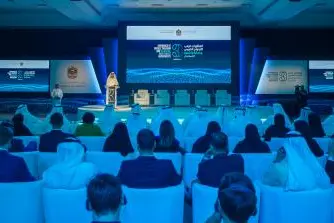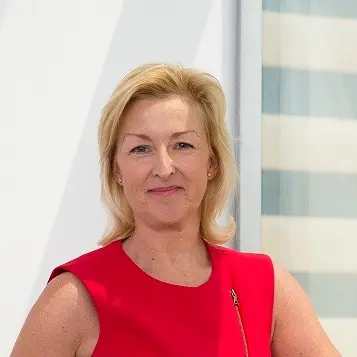PHOTO
Dubai: The Ministry of Finance (MoF) held an official ceremony today to celebrate 30 years of signing the avoidance of double taxation and bilateral investment agreements. H.H. Sheikh Hamdan bin Rashid Al Maktoum, Minister of Finance; H.H. Sheikh Ahmed bin Saeed Al Maktoum, President of Dubai Civil Aviation Authority, CEO and Chairman of Emirates Group and Second Vice Chairman of Dubai Executive Council; H.E. Obaid Humaid Al Tayer, Minister of State for Financial Affairs, as well as their Excellencies Ambassadors, Consuls, senior UAE government officials, and strategic partners of the ministry attended the ceremony. A press conference to announce and sign the three-year (2019-2021) extension of the MoU between the UAE and the Organisation for Economic Cooperation and Development (OECD) also took place. The MoU stipulates mutual cooperation between both parties in developing a better understanding of the practical application of international tax principles.
H.H. Sheikh Hamdan bin Rashid Al Maktoum stressed the strategic importance of these agreements, and stated the wise leadership of the UAE and its forward-looking vision recognised the importance of signing these agreements to reduce the tax burden on local investments abroad and protect them from non-commercial risks, thereby enhancing the competitiveness of the country and its attractiveness to investments from around the world. H.H said: “The agreements to prevent double taxation and protect and promote investments are an important element in the process of attracting foreign investment and improving the nation’s competitiveness, which in turn contribute to supporting the country’s development goals and diversifying sources of national income.”
H.E. Obaid Humaid Al Tayer, Minister of State for Financial Affairs, affirmed the ministry’s commitment to expand the UAE's international network of relations by signing agreements to prevent double taxation and agreements to protect and promote investment. These agreements strengthen the country's trade and economic relations, provide more investment opportunities for companies, boost foreign investments and promote trade, commodity exchange and cross-border movement of capital. H.E. said: “The Ministry of Finance has taken important steps in this direction and has signed as many as 210 tax agreements to date. The nation also assumed an important position in disseminating knowledge related to double taxation issues in the region and the world. Furthermore, as a strategic partner of the OECD it has held regional workshops on tax treaty issues, and raised awareness among governments of the region on these issues.”
In the opening speech of the ceremony, H.E Younis Haji Al Khoori, Undersecretary of MoF, welcomed their Excellencies and thanked them for participating in the ministry’s celebration of 30 years of signing these agreements. The first negotiation on the avoidance of double taxation and protection and promotion of investment agreement, which aims to achieve economic balance and protect investments from all non-commercial risks, took place in 1989 with friendly countries. Overall, between 1989 and 2018 the nation has signed 210 agreements, including 123 agreements to avoid double taxation and 87 agreements to protect and promote investment. The country ranked second in the world in terms of avoidance of double taxation agreements and first among the Arab nations.
H.E. said: “The UAE's sovereign fund investments, private sector investment, and national carriers operating in air transport income were subject to heavy taxes ranging from 20-30% of total profits, affecting their operations and reducing profitability. However, after the signing of these agreements and trade and investment partnerships, economic balance was achieved with several nations. These investments enjoyed multiple tax benefits, resulting in reduced tax costs, increased investment efficiency, thereby contributing to the diversification of national income sources and the development of the air transport industry. Agreements to protect and encourage investment have increased foreign capital inflow, protected the country's overseas investments from commercial risks, and improved the investment climate and business environment."
H.E. added: “MoF realised that the elimination of double taxation is an important element in the international investment climate because it provides full protection to investors. Furthermore, it clarifies the financial situation of taxpayers engaged in commercial, industrial or financial activities, and helps prevent the disruption of capital and technology transfer. The UAE is therefore working to eliminate the misuse of tax agreements and tax evasion by signing several agreements with the OECD and The Global Forum on Transparency and Exchange of Information for Tax Purposes. These include the Convention on Mutual Administrative Assistance in Tax Matters, the Multilateral Competent Authority Agreement to facilitate the automatic exchange of information between the concerned authorities and the agreement on the exchange of Country-by-Country reports (MCAA CbCR). It also joined the Inclusive Framework on Base Erosion and Profit Shifting (BEPS) by signing the Multilateral Convention (MLI) agreement."
Following the official ceremony and during the press conference, H.E. Younis Haji Al-Khoori, on behalf of the UAE, and Grace Perez-Navarro, Deputy Director of the Center for Tax Policy and Administration, on behalf of the OECD, signed a Memorandum of Understanding to extend the program of joint educational seminars for three years (2019-2021). The program aims to provide support and assistance to countries of the MENA region in the area of tax agreements and help them develop better understanding of the practical application of international tax principles.
In his speech, the minister stressed the pioneering role played by the OECD in developing tax treaty networks, as well as the necessary skills in negotiation technology and treaty design. H.E. added: “The OECD recognised the need for the Middle East to have a regional dialogue on the key tax treaties issues facing officials in terms of assessment and implementation, as well as the importance of establishing channels of communication to help them support their tax network. To fill this gap, and in recognition of the UAE’s role in tax agreements, the OECD recommended that the UAE, supported by the OECD, should be the regional centre for dialogue in the MENA region in order to enhance the expertise of other countries. Based on this international recognition, the Ministry of Finance signed several Memoranda of Understanding between 2007 and 2018, with the aim to hold regional workshops on tax treaty issues, which more than 600 participants from the MENA region, East Asia and the Post-Soviet states have attended thus far. This made the UAE the first non-member country to be involved in a strategic partnership with the OECD.”
Since its establishment, the UAE adopted a forward-looking vision; its strategy of diversifying sources of income was achieved through progressive policies, infrastructure development, a more conducive investment climate and foreign direct investment. This increased the contribution of non-oil sectors to the GDP, and provided an enabling environment for international companies to base their headquarters in the UAE.
The double taxation agreements and protection and promotion of investments agreements signed by the nation with other countries over the past three decades have contributed to the common benefits of the UAE and its partners. It has helped facilitate cross-border trade and investment, reduced non-commercial risks, applied transparency standards and enhanced international economic cooperation. The signing of tax agreements began in 1989 with the government mandate of the Ministry of Finance to sign agreements on the avoidance of double taxation, and the protection and promotion of investments. The first agreement on the avoidance of double taxation was signed in 1989 with France, followed by the signing of the first agreement to protect and promote investment in 1991 with France and Malaysia.
In 2006, the Ministry of Finance was authorised to represent the nation in signings with the OECD, as well as countries of the MENA region, to enter into agreements to avoid double taxation and promote the adoption of international tax standards. In 2010, the UAE joined the Global Forum on Transparency and Exchange of Information for Tax Purposes. The year 2018 witnessed the signing of the first double taxation agreement in the GCC between the UAE and Saudi Arabia. Today, the network of double taxation agreements established by the United Arab Emirates is the largest and widest in the MENA region, reinforcing the country's standing as a leading financial centre in the world.
The official event included a speech by Grace Perez-Navarro, Deputy Director of the OECD's Centre for Tax Policy and Administration, followed by a panel discussion with speakers from the Ministry of Finance, the OECD, and participants from the private sector, who gave testimonials of their success stories. The ceremony concluded with a press conference during which an extension of the cooperation agreement between the UAE and the OECD was signed for an additional three years.
-End-
© Press Release 2019Disclaimer: The contents of this press release was provided from an external third party provider. This website is not responsible for, and does not control, such external content. This content is provided on an “as is” and “as available” basis and has not been edited in any way. Neither this website nor our affiliates guarantee the accuracy of or endorse the views or opinions expressed in this press release.
The press release is provided for informational purposes only. The content does not provide tax, legal or investment advice or opinion regarding the suitability, value or profitability of any particular security, portfolio or investment strategy. Neither this website nor our affiliates shall be liable for any errors or inaccuracies in the content, or for any actions taken by you in reliance thereon. You expressly agree that your use of the information within this article is at your sole risk.
To the fullest extent permitted by applicable law, this website, its parent company, its subsidiaries, its affiliates and the respective shareholders, directors, officers, employees, agents, advertisers, content providers and licensors will not be liable (jointly or severally) to you for any direct, indirect, consequential, special, incidental, punitive or exemplary damages, including without limitation, lost profits, lost savings and lost revenues, whether in negligence, tort, contract or any other theory of liability, even if the parties have been advised of the possibility or could have foreseen any such damages.



















